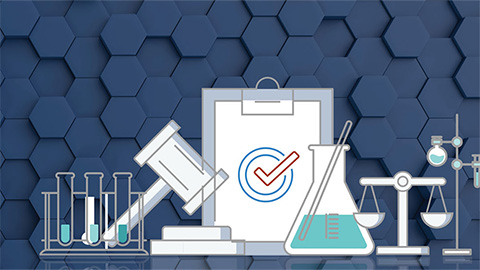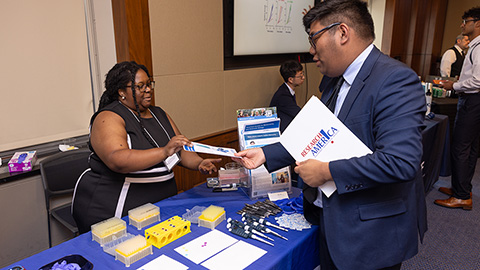ASBMB urges NIAID to prioritize DEAI
The American Society for Biochemistry and Molecular Biology sent recommendations March 30 to the National Institute of Allergy and Infectious Diseases on expanding the institute’s diversity, equity, accessibility and inclusivity activities.
The society recommended, broadly, that the NIAID expand the use of diversity and re-entry grant supplements and better support disabled, LGBTQ+ and other underrepresented scientists.
“Because NIAID is one of the largest NIH institutes, they have an obligation to lead the way in making the scientific enterprise more equitable and accessible,” Sarina Neote, public affairs director of the ASBMB, said. “All underrepresented groups face challenges that we have brought to the federal government’s attention, but we hope our recommendations will drive changes allowing the disabled and LGBTQ+ populations to feel more at home in the sciences.”
According to the National Institutes of Health, diversity supplements aim to “increase diversity in the research workforce by providing training, mentorship and career development opportunities to individuals who are underrepresented in biomedical, behavioral, clinical, social and basic sciences research.” However, less than 1% of NIAID’s R01 grants are associated with diversity supplements, causing them to lag behind other NIH institutes.
Therefore, the ASBMB recommended that NIAID “conduct targeted outreach to underrepresented communities and investigators who serve in them to disseminate necessary information on diversity supplements, including how to apply for them, and eligibility criteria.” In addition, the ASBMB said NIAID needs to clarify eligibility requirements for diversity supplements, including granting eligibility to underrepresented Asian groups.
Reentry supplements aid scientists who attempt to reenter the workforce after a prolonged leave due to childrearing, caregiving, sexual harassment and other circumstances. The ASBMB recommended NIAID offer additional re-entry and re-integration supplements and expand their advertisement. “There are many pathways leading into scientific careers and out of them; all these experiences from individual scientists create a diverse, fruitful, innovative research ecosystem,” the society wrote. “Providing more opportunities for individuals to re-enter the scientific enterprise will benefit the innovative pipeline.”
Disabled individuals face enormous obstacles while trying to pursue a scientific education or career, Neote said. Because the majority of lab spaces are not accessible, the ASBMB urged “the NIAID to conduct outreach to institutions serving students with disabilities in STEM, offer infrastructure supplements to update labs to be ADA accessible and meet the principles of universal design, and ensure that all program announcements are reaching every scientist, regardless of their disability status.”
The ASBMB also called upon NIAID to expand funding for disability research as a recent NIH-funded report identified health and health care disparities affecting people with disabilities, which will help institutions meet the needs of this often-forgotten population.
In addition, the ASBMB urged the NIAID to provide more support for LGBTQ+ and underrepresented scientists, including establishing outreach programs. To aid in NIAID’s efforts to expand these resources, the ASBMB recommended creating an action plan similar to the National Institute on Drug Abuse Racial Equity Initiative, partnering with NIH’s UNITE program and establishing partnerships with minority-serving and predominately undergraduate institutions.
Enjoy reading ASBMB Today?
Become a member to receive the print edition four times a year and the digital edition monthly.
Learn moreGet the latest from ASBMB Today
Enter your email address, and we’ll send you a weekly email with recent articles, interviews and more.
Latest in Policy
Policy highlights or most popular articles

Embrace your neurodivergence and flourish in college
This guide offers practical advice on setting yourself up for success — learn how to leverage campus resources, work with professors and embrace your strengths.

ASBMB honors Lawrence Tabak with public service award
He will deliver prerecorded remarks at the 2025 ASBMB Annual Meeting in Chicago.

Summer internships in an unpredictable funding environment
With the National Institutes of Health and other institutions canceling summer programs, many students are left scrambling for alternatives. If your program has been canceled or delayed, consider applying for other opportunities or taking a course.

Black excellence in biotech: Shaping the future of an industry
This Black History Month, we highlight the impact of DEI initiatives, trailblazing scientists and industry leaders working to create a more inclusive and scientific community. Discover how you can be part of the movement.

ASBMB releases statement on sustaining U.S. scientific leadership
The society encourages the executive and legislative branches of the U.S. government to continue their support of the nation’s leadership in science.

ASBMB and advocacy: What we accomplished in 2024
PAAC members met with policymakers to advocate for basic scientific research, connected some fellow members with funding opportunities and trained others to advocate for science.

